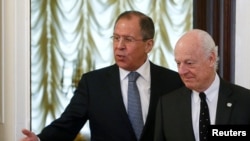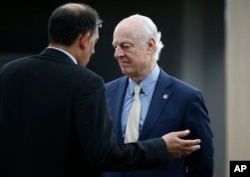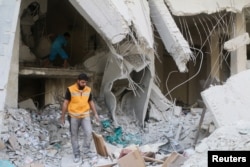U.N. envoy Staffan de Mistura said Tuesday he wants to get the two-month-old cessation of hostilities in Syria "back on track" as he met in Moscow with Russian Foreign Minister Sergei Lavrov.
The cease-fire between pro-government forces and rebel fighters went into effect in late February, leading to a dramatic drop in violence that has slowly eroded as both sides alleged repeated violations. The fighting has been worst around the northern city of Aleppo where government airstrikes and rebel shelling have killed hundreds of people during the past week.
Syrian state media said rebel rockets hit a hospital Tuesday in Aleppo, killing or wounding dozens of people.
Proposals on cease-fire
At the start of his meeting with de Mistura, Lavrov said Russia and the United States are both working to strengthen the cease-fire. Lavrov's office said he discussed the situation in a phone call Monday with U.S. Secretary of State John Kerry, and that they both urged all sides to "strictly observe" the truce.
The call followed Kerry's own meeting with de Mistura in Geneva where he said the United States and its partners are discussing "several proposals" to stop the spiraling violence." Kerry did not specify what those proposals are.
News agencies quoted U.S. officials who requested anonymity as saying the United States is considering mapping out “safe zones” marked by “hard lines” that would provide refuge for civilians and members of the moderate opposition.
No help from Russia
Getting Russia’s support has been key but elusive for Kerry, who has called for Moscow’s help in getting Syrian President Bashar al-Assad’s forces to stop their assault on rebel-held parts of Syria’s largest city.
“There are several proposals that are now going back to key players to sign off,” Kerry said after his meetings Monday with de Mistura and Saudi Foreign Minister Adel Al-Jubeir. “We are hopeful but we are not there yet,” Kerry said, adding the U.S. and its partners “are going to work very hard in the next 24 hours, 48 hours to get there.”
Kerry said an agreement on Aleppo could be announced in the coming days.
For the United States, it is important to show it has not given up on resolving the five-year-old conflict, but there are questions on whether a low level of U.S. commitment has resulted in a Russian victory in the region as the Russian-backed Syrian government forces retake large swaths of land.
“We’re in a kind of phase in the conflict where there are ongoing battles for advantage happening,” David Butter, a Middle East analyst at Chatham House in London, told VOA. “Of course, the momentum is very much on the Assad regime.”
Key battle
The battle for Aleppo is key at a time when the conflict has become a test of U.S. commitment in the region.
Kerry arranged the trip after it became clear the humanitarian situation in the city was deteriorating rapidly and as proximity talks between the Assad government and the moderate opposition failed.
Scenes of escalating violence and atrocities committed against civilians are an opportunity for the United States to demonstrate a leadership role in resolving the conflict, analysts say.
As Syrian forces prepared the latest assault on Aleppo two weeks ago, Russia had successfully portrayed the efforts as a counter-terrorist operation to strike at the al-Nusra Front, which the United States and Russia consider a terrorist group.
Analysts note that U.S. officials, intentionally or not, were interpreted as being unopposed to the Aleppo operation before it began. U.S. military officials were quoted as saying the al-Nusra front was a major dominant force in the city and “not part” of the cease-fire.
The perception changed when an airstrike hit Aleppo’s al Quds hospital, a facility supported by the group Medecins Sans Frontieres (Doctors Without Borders) killing several children and medical staff, including one of the city’s remaining pediatricians.
The incident outraged Kerry and analysts say it was an opportunity for the U.S. to step up its efforts to change any perception that it was not taking an active enough role in resolving the Syrian conflict.
IN PICTURES: Deadly Airstrikes Hit Aleppo Hospital, Dozens Killed
US needs to show commitment
Demonstrating the U.S. administration’s commitment to fulfill promises remains a major task for Kerry.
“[President] Obama set the tone by talking quite a big game on Syria, but not having any strategic commitments. Because the U.S. hasn’t really invested, it’s not got much to lose except as a non-actor,” said analyst David Butter.
Jasmine Gani, an analyst at the Center for Syrian Studies at the University of St. Andrews in Scotland, told VOA that perceptions of U.S. legitimacy in the region hang in the balance as a result of what she calls a “mismatched rhetoric and policy.” She says Washington raised expectations by calling for Assad’s exit early in the conflict and then failed to provide the support needed to carry out that aim.
With Russia now figuring strongly in the equation, Gani said the U.S. “has to be a lot more careful as to what it puts its commitment to. In the past, it was not such a problem, but the shift of dynamics in global power means there is greater scrutiny on the United States to fulfill its promises.”









